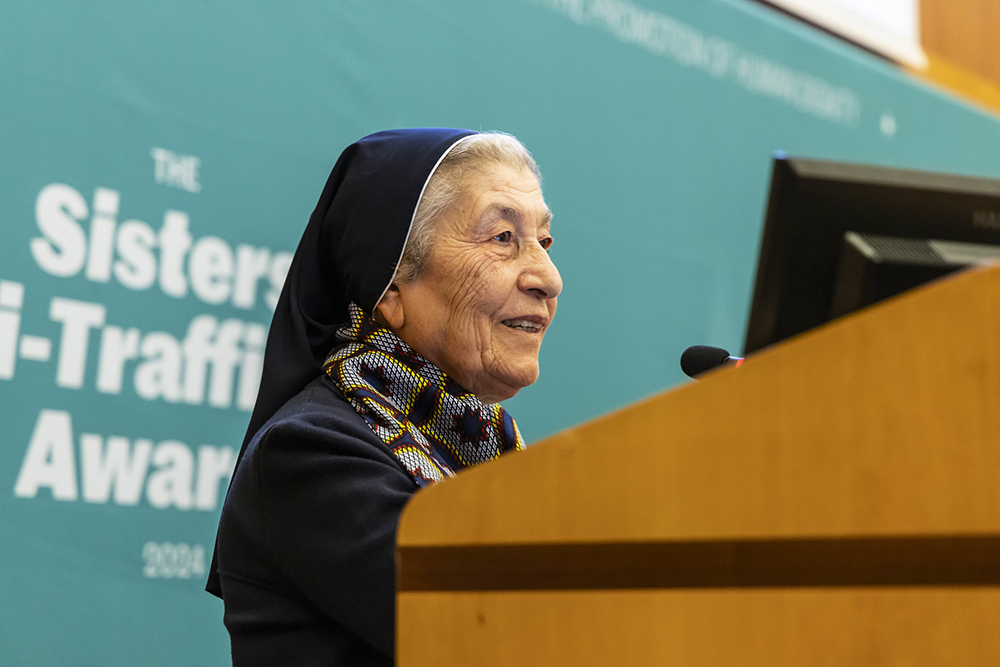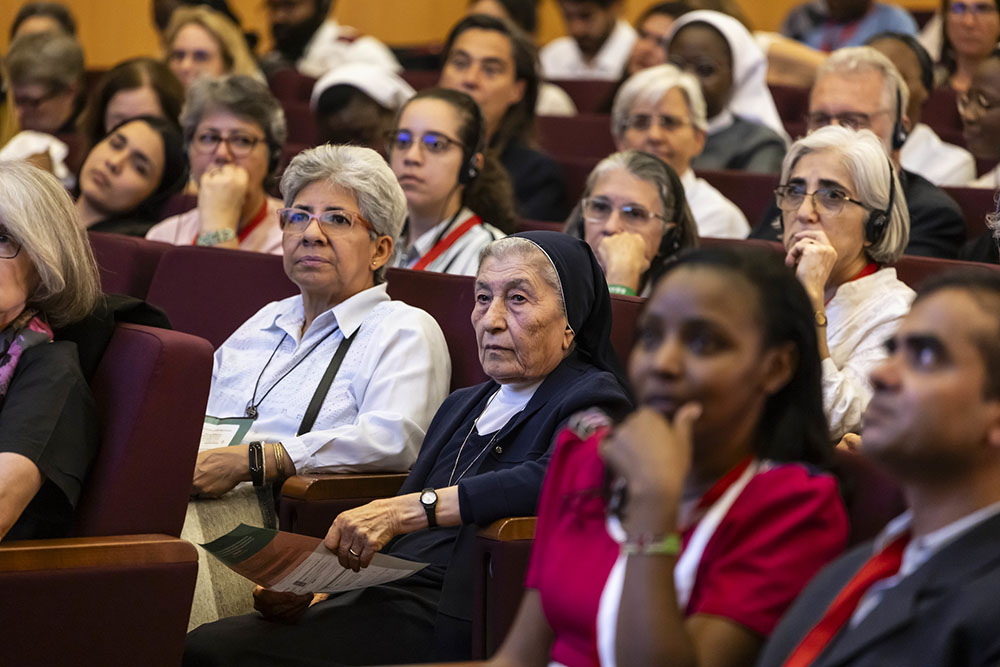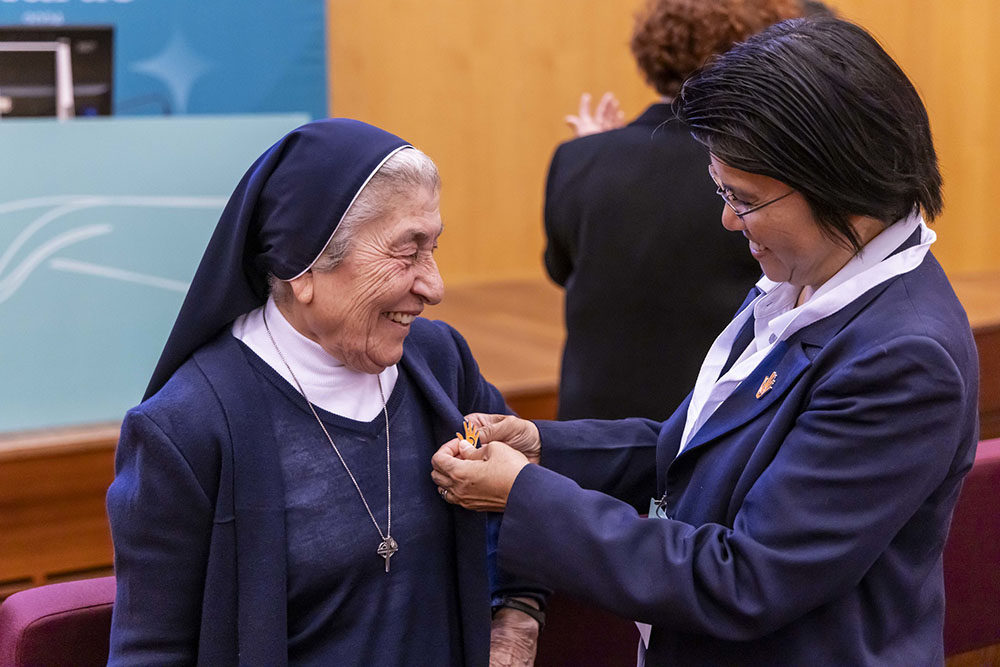
Sr. Marie Claude Naddaf giving a short speech upon receiving the Human Dignity Award for lifetime achievement at the 2024 Sisters Anti-Trafficking Awards. (Stefano Dal Pozzuolo)
Sr. Marie Claude Naddaf is a member of Our Lady of Charity of the Good Shepherd and the regional coordinator of Wells of Hope in the Middle East.
She is known internationally for her work against human trafficking and was recently awarded the Human Dignity Award for lifetime achievement at the 2024 Sisters Anti-Trafficking Awards ceremony held in Rome in May 2024. The ceremony was organized by Arise, the International Union of Superiors General (UISG) and the Conrad N. Hilton Foundation. (The Conrad N. Hilton Foundation is a major funder of Global Sisters Report.)
Naddaf is currently in the midst of the Lebanon crisis. "We are in a situation of tension and sadness … with a power outage and a lack of means of communication," she told Global Sisters Report in an e-mail exchange.
"There is an exodus of the population from the south of the country to Beirut, [and] this increases exploitation and trafficking on all levels," she added.
Despite limited internet access, Naddaf managed to speak with GSR for an interview.
Advertisement
GSR: You are one of the three awardees of the Sisters Anti-Trafficking Awards, namely the recipient of the Human Dignity Award for lifetime achievement. How does it feel to receive this award?
Naddaf: Receiving the Human Dignity Award for lifetime achievement is an incredibly humbling experience. It's not just a recognition of personal efforts but a testament to the collective work of many dedicated individuals and organizations fighting against human trafficking.
This award reinforces the importance of my mission and inspires me to continue advocating for the rights and dignity of all individuals. Overall, it was a moment of gratitude and motivation to push forward in the fight for justice and human rights. I was feeling so emotional and did not understand what was happening around me.
Can you tell us about the ceremony at the Sisters Anti-Trafficking Awards in Rome and how it unfolded? What stood out to you the most?
The ceremony in Rome was truly memorable. As attendees gathered, there was a palpable sense of solidarity among those committed to combating human trafficking. Key moments included powerful speeches from survivors, highlighting the resilience of individuals who have endured unimaginable hardship. Their stories served as poignant reminders of why our work is crucial.
What stood out to me the most was the overwhelming support from various sectors [of] activists, policymakers and community leaders coming together to share insights and strategies. The atmosphere was one of unity and determination, emphasizing that while progress has been made, there is still much work to be done. The ceremony concluded with the commitment to continue the fight against trafficking, reinforcing that this award is not just an honor but a call to action for all of us.

Sr. Marie Claude Naddaf sitting amongst 200 participants at the 2024 Sisters Anti-Trafficking Awards in Rome. (Stefano Dal Pozzuolo)
You are also part of Talitha Kum, the International Network of Consecrated Life Against Human Trafficking. What is your involvement in the network like?
My involvement with the International Network of Consecrated Life Against Trafficking involves collaboration with various organizations and stakeholders to share resources, strategies and data to combat human trafficking effectively. We focus on awareness, advocacy and supporting survivors.
How was your work affected by the war in Lebanon? What would you like to say regarding this situation?
The ongoing war in Lebanon significantly impacts our work. The conflict exacerbates vulnerabilities, increasing the risk of trafficking as people are displaced and desperate for safety. This situation necessitates a swift and coordinated response to protect at-risk populations.
In light of this, I urge the international community to prioritize humanitarian assistance and support initiatives preventing trafficking in conflict zones. It's crucial to ensure that resources are allocated effectively to address the needs of those affected and to strengthen protective measures for vulnerable individuals. Our collective efforts must be focused on both immediate relief and long-term solutions to combat trafficking in the face of such crises.
Do you also work against child trafficking? What can you tell us about it?
For children of trafficking, it is poignant. What hurts and breaks your heart is to find children in rags in the streets without a home, children who have escaped or were sent [away] by their parents to spare them the worst. Children traumatized for life, who have seen so many bloody corpses (father, mother, grandparents or brothers and sisters) in addition to the deafening bombings, the exodus in the nights ... what can I tell you? It is indescribable. Pray for us.

Sr. Abby Avelino, Talitha Kum international coordinator, pinning the official logo of Talitha Kum to Sr. Marie Claude Naddaf, identifying her as a Talitha Kum anti-trafficking advocate. (Stefano Dal Pozzuolo)
What has motivated you over the years to fight against human trafficking? How do we prevent human trafficking as a society?
As a sister of Our Lady of Charity of Good Shepherd, our charism is to fight against trafficking. As a society, we can prevent human trafficking by advocating policymakers, [raising] awareness and implementing laws where the offender takes his punishment and victims get needed support.
Staying hopeful in the fight against human trafficking can be challenging. However, several key factors help me stay optimistic, such as survivors' stories, progress and awareness, community networking and commitment to change.
Speaking of survivor stories, can you tell us a significant story on the topic of human trafficking that has impacted you over the years?
A significant story is the story of "Basawite," an Ethiopian who was in a modern slavery state of trafficking in Syria. She spent more than 15 years working in a home without getting her salary and without going out and reaching others from her community.
I have been following this case with the Talitha Kum network team in Syria in collaboration with the government's anti-trafficking body. It was the long journey of an Ethiopian girl who suffered from modern slavery. We made our connections on international, regional and local levels. We also made a "chain of prayer" between the Ethiopian community, her family, our friends and our teams in the four countries. It was a miracle when she reached her motherland.






